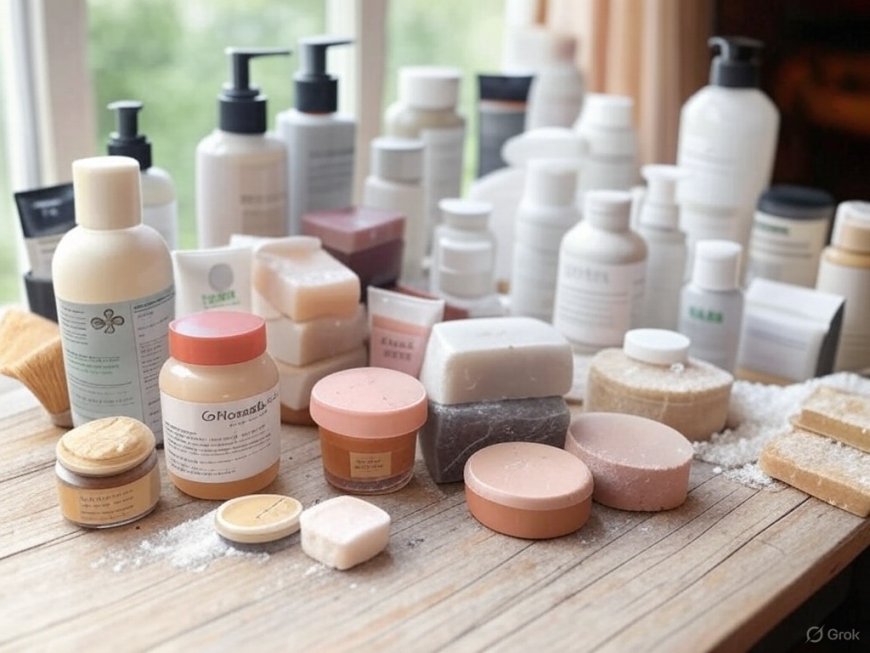The Hidden Dangers of “Natural” Beauty Products: What Brands Don’t Tell You
Natural beauty products aren’t always safer. Learn about hidden risks like bacterial growth, allergens, and misleading labels in the clean beauty industry.

Introduction
The beauty industry has witnessed a massive shift toward “natural” and “organic” products in recent years. Consumers, increasingly aware of harmful chemicals in conventional cosmetics, are opting for products labeled as clean, non-toxic, and plant-based. However, many so-called "natural" beauty products may not be as safe as they claim.
From misleading labels to hidden allergens and ineffective preservation methods, the risks of using unregulated natural beauty products are often overlooked. This article exposes the hidden dangers of the natural beauty trend, helping consumers make informed choices.
The Misleading Labels in Natural Beauty
Many beauty brands capitalize on the demand for clean beauty by using vague marketing terms. Some common misleading claims include:
- “All-Natural” or “100% Natural” – There is no regulatory definition for these terms, meaning companies can use synthetic ingredients while still labeling products as natural.
- “Chemical-Free” – Everything, including water, is a chemical. This term is scientifically inaccurate and designed to mislead consumers.
- “Organic” Without Certification – Unless certified by organizations like the USDA or ECOCERT, organic claims can be dubious.
According to a report by the Environmental Working Group (EWG), nearly 80% of "natural" beauty products contain synthetic or potentially harmful ingredients.
Hidden Dangers in Natural Beauty Products
1. Lack of Preservation Leads to Bacterial Growth
One of the biggest risks of natural beauty products is inadequate preservation. Many brands avoid synthetic preservatives like parabens and phenoxyethanol due to fearmongering, but natural alternatives are often ineffective.
A study from Harvard University found that improperly preserved natural cosmetics can develop mold, yeast, and harmful bacteria, leading to skin infections and irritations.
Common Culprits:
- DIY skincare products with no preservatives
- Natural creams and serums stored in warm, humid conditions
- Products containing only essential oils as preservatives
2. Essential Oils Can Be Irritating and Toxic
Essential oils are commonly used in natural beauty products, but they are highly potent and can be irritating to sensitive skin. Some essential oils are even phototoxic, meaning they react with sunlight and cause burns or discoloration.
High-Risk Essential Oils:
- Citrus Oils (Lemon, Lime, Bergamot) – Can cause severe sun sensitivity.
- Tea Tree & Peppermint Oil – Potentially irritating in high concentrations.
- Lavender & Eucalyptus Oil – Known allergens for sensitive skin.
According to research from the American Contact Dermatitis Society (ACDS), essential oils are among the top causes of allergic reactions in skincare products.
3. Natural Fragrances Can Be Just as Harmful as Synthetic Ones
Many consumers assume that "natural fragrance" is safer than synthetic fragrance, but this isn’t always true. Essential oil blends and botanical extracts can contain hundreds of compounds, some of which can trigger allergies, headaches, and skin irritation.
According to Allergy UK, fragrance (both natural and synthetic) is one of the most common skin irritants, leading to eczema flare-ups and respiratory issues in sensitive individuals.
4. Heavy Metals in “Mineral” and “Organic” Makeup
Mineral-based cosmetics are often marketed as a clean alternative to traditional makeup, but studies show that some contain dangerous levels of heavy metals, including:
- Lead (linked to neurotoxicity and reproductive harm)
- Arsenic (a known carcinogen)
- Cadmium (linked to kidney damage and bone loss)
A report by the FDA revealed that certain natural lipsticks and foundations contained measurable amounts of lead, exceeding safe levels. Since cosmetics are not heavily regulated, brands are not required to test for these contaminants.
5. No Regulation = No Accountability
Unlike the pharmaceutical industry, the beauty industry is largely self-regulated. In the U.S., the FDA does not require pre-market approval for cosmetics, meaning companies can launch products without rigorous safety testing.
Even the EU, which has stricter cosmetic laws, does not regulate the term "natural," allowing brands to use it freely. This lack of oversight means that consumers must do their own research to verify product safety.
How to Choose Safer Natural Beauty Products
While many natural beauty products are safe and effective, consumers must be vigilant. Here’s how to ensure you're choosing truly safe and high-quality products:
1. Look for Third-Party Certifications
Always check for reliable certifications that verify ingredient claims:
- USDA Organic (For genuine organic ingredients)
- ECOCERT (European organic certification)
- EWG Verified (Assessed for ingredient safety)
- Leaping Bunny or PETA (Cruelty-free verification)
2. Avoid Products With a Short Shelf Life
If a product lacks preservatives but has a long shelf life, it’s a red flag. Either it's misleadingly labeled or at high risk of contamination.
3. Be Cautious With DIY Skincare
Homemade masks and creams can be fun, but lack of preservation can lead to bacterial overgrowth. Always refrigerate and use fresh ingredients.
4. Patch Test Before Using New Products
Even natural ingredients can cause allergies. Apply a small amount to your inner wrist and wait 24 hours before using a new product.
5. Choose Science-Backed Natural Beauty Brands
Instead of blindly trusting “natural” marketing, look for brands that use clinically tested, science-backed ingredients. Brands like Paula’s Choice, Biossance, and The Ordinary prioritize transparency and ingredient safety.
Conclusion
The natural beauty industry is booming, but not all “clean” products are as safe as they seem. Misleading labels, poor preservation, allergens, and heavy metal contamination pose serious health risks. Instead of trusting buzzwords like “natural” and “organic,” consumers must read ingredient lists, check certifications, and choose science-backed brands.
By staying informed, we can navigate the beauty industry with confidence—without falling for marketing myths.
What's Your Reaction?
 Like
0
Like
0
 Dislike
0
Dislike
0
 Love
0
Love
0
 Funny
0
Funny
0
 Angry
0
Angry
0
 Sad
0
Sad
0
 Wow
0
Wow
0



















































